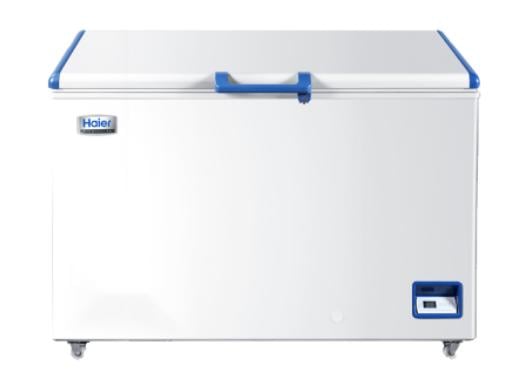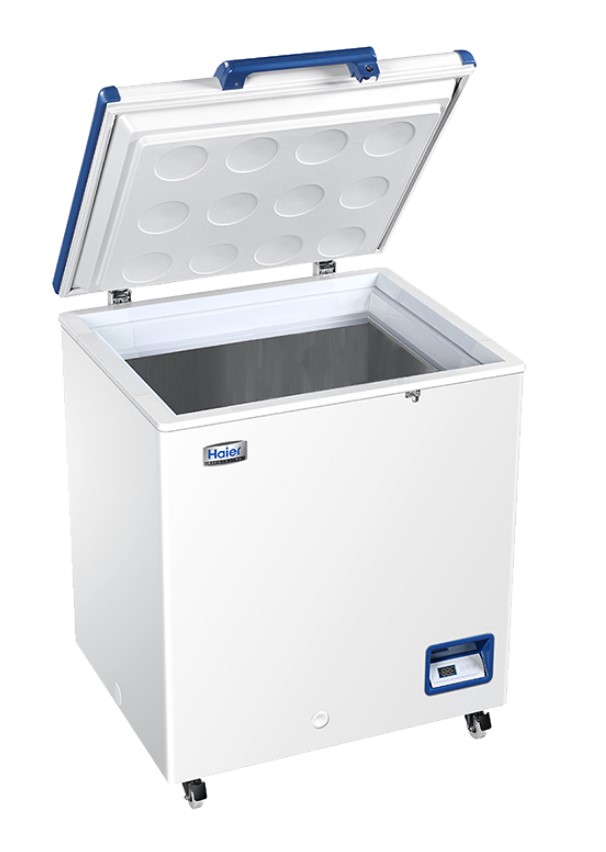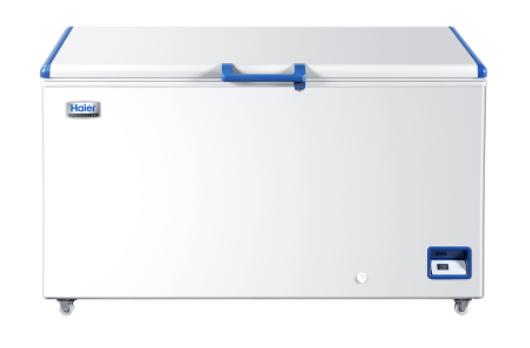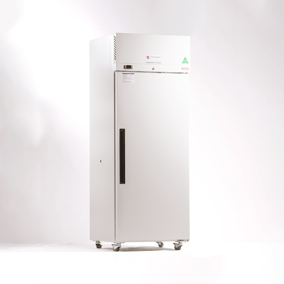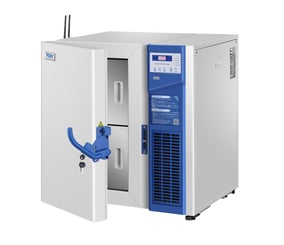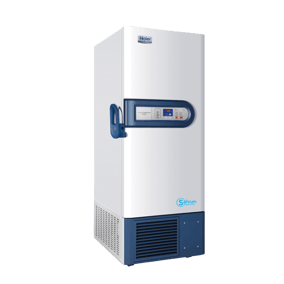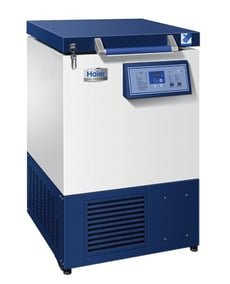-60°C Biomedical Chest Freezer DW-60W
The Haier Biomedical Chest Freezer is a versatile storage solution, capable of securely housing a wide range of biological samples, as well as providing a low-temperature testing environment for special materials.
These freezers are commonly used in hospitals, research institutions, and medical laboratories due to their excellent safety features, easy operation, and reliable functionality for storage of biological products and biological samples such as blood cells, viruses, bone and bacteria. Also used for electronic devices and other materials used for cryogenic tests.
Overview
Equipped with a single compressor auto cascade refrigeration system, this freezer provides high-efficiency cooling power, while 100mm insulation thickness ensures optimal protection for cold temperature and energy conservation. Thanks to its HC refrigerant system, this freezer is optimised for improved refrigeration efficiency, reducing energy consumption by up to 50%.
Key Features
- Efficient Cooling System: The single compressor auto cascade refrigeration system ensures high efficiency and reliable cooling power.
- Enhanced Insulation: 100mm insulation thickness provides optimal protection for cold temperatures and energy conservation.
- Eco-Friendly Refrigerant: The HC refrigerant system improves refrigeration efficiency and reduces energy consumption by up to 50%.
Advanced Design
- Noise Cancelling Technology: Ensures a low noise level of less than 43 dba, creating a quieter working environment.
- Multiple Alarm System: Includes temperature alarms, sensor error alarms, power failure alarms, and remote alarms for comprehensive monitoring.
- Dual Seals Design: Retains cold temperature more effectively and eliminates condensation on gaskets.
User Convenience
- Security Features: Interior lock and lockable casters provide added security and ease of installation and manoeuvring.
- Precise Temperature Control: The waterproof digital control system ensures accurate temperature management.
- Easy Maintenance: The stainless steel inner cabinet is easy to clean, maintaining a hygienic environment.
Benefits
- Energy Efficiency: The HC refrigerant system and high-efficiency cooling reduce energy consumption, saving costs and promoting sustainability.
- Enhanced Security: Multiple alarm systems and secure locking features ensure the safety and integrity of stored samples.
- User-Friendly Design: Low noise operation, precise temperature control, and easy manoeuvrability make this freezer convenient for daily use in any laboratory setting.
Summary
This high-efficiency laboratory freezer combines advanced technology with practical design to provide optimal cooling performance and energy conservation. With features like noise-cancelling technology, a comprehensive alarm system, and user-friendly controls, it is an excellent choice for maintaining the integrity of your valuable samples. Trust in this freezer for reliable, secure, and efficient cold storage solutions.
Specifications
- Dimensions
-
DW-60W138 DW-60W258 DW-60W388 External WxDxH (mm) 790x770x950 1210x770x950 1655x770x950 Internal WxDxH (mm) 580x445x620 1000x445x620 1450x445x620 Packing WxDxH (mm) 815x800x990 1255x800x990 1695x800x990 - Technical Specifications
-
DW-60W138 DW-60W258 DW-60W388 Technical Data Cabinet Type Chest Chest Chest Climate Class N N N Cooling Type Direct Cooling Direct Cooling Direct Cooling Refrigerant HC HC HC Sound Level ((dB(A)) 43 43 43 Performance Cooling performance (°C) -60 -60 -60 Temperature Range (°C) -30~-60 -30~-60 -30~-60 Control Controller Microprocessor Microprocessor Microprocessor Display LED LED LED Electrical Data Power Supply (V/Hz) 220~240/50 220~240/50 220~240/50 Power (W) 370 410 420 Electrical Current (A) 3 3 3.5 Power Consumption (kWh/24h) 4.5 5.5 6.5 Capacity (L/Cu.Ft) 138/4.9 258/9.1 388/13.7 Loading Quantities Container Load (20'/40'/40'H) 28/56/56 22/46/46 14/28/28 Net/Gross Weight (kg) (approx) - Features
-
DW-60W138 DW-60W258 DW-60W388 Caster ✔ ✔ ✔ Porthole ✔ ✔ ✔ - Safety
-
DW-60W138 DW-60W258 DW-60W388 High/Low Temperature ✔ ✔ ✔ Sensor Error ✔ ✔ ✔
Downloads
Support & FAQs
At Thermoline, we strive to supply helpful customer support to ensure that you get the most out of our products. We are committed to providing whatever support our customers need, wherever they are in the world. If you can't find your solution in the below FAQs or Knowledge Base, please contact our friendly support team.
- How often should you defrost a lab freezer?
The frequency of defrosting a lab freezer depends on the model and the usage pattern. However, it is generally recommended to defrost a lab freezer at least once or twice a year to maintain its optimal performance.
A buildup of ice in the freezer can reduce its efficiency and increase the risk of freezer burn, damaging the quality of the samples stored inside. It can also increase the risk of mechanical failure, leading to costly repairs or even loss of samples.
Following the manufacturer's instructions for defrosting the freezer is important, as the process may vary depending on the model. Generally, defrosting should be done when the freezer is relatively empty, with the samples stored elsewhere temporarily. The freezer should be turned off and allowed to thaw completely before cleaning and restarting.
In addition to regular defrosting, keeping the freezer clean and well-maintained is vital to ensure its longevity and reliability.
- What different types of laboratory freezer are available?
There are several types of laboratory freezers available, including:
-
Upright freezers: These freezers have a vertical orientation and are available in a range of sizes, from under benchtop models to large capacity units that can store hundreds of samples. Upright freezers typically have several shelves, drawers or compartments for easy organisation of samples.
-
Chest freezers: Chest freezers have a horizontal orientation and are often used for storing large or bulky items. They are more energy efficient than upright freezers and can provide longer holdover times during power outages.
- Biomedical Chest Freezers: These -60°C chest freezers are suitable for storing a wide variety of biological products including viruses, bacteria, blood cells, skin and bone as well as ocean-going supplies and electronic devices.
-
Ultra-low temperature freezers: These freezers provide even lower temperatures, down to -80°C. They are often used for long-term storage of biological specimens, vaccines, and other critical materials.
-
- What are the benefits of a chest freezer over upright?
There are several benefits of owning a chest freezer over an upright:
-
More Storage Space: A chest freezer provides extra storage space, which is particularly useful if you have a large products or samples.
-
Energy Savings: Chest freezers are generally more energy-efficient than upright freezers, as they have less air space to cool and maintain their temperature more easily. This can result in lower energy bills over time.
-
Emergency Preparedness: In the event of a power outage, a chest freezer will keep samples frozen for a longer period of time, giving you more time to find an alternative solution. This can be particularly important during natural disasters or other emergencies.
-

